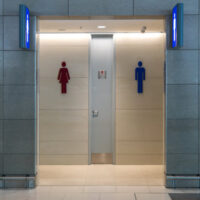Navigating The Bathroom Bill For Transgender Floridians

Governor Ron DeSantis passed a number of anti-transgender bills that appear to violate Title VII of the Civil Rights Act. While Donald Trump was still in office, the Supreme Court ruled that gender identity and gender nonconformity were both covered by gender protections outlined in the Civil Rights Act.
Essentially, the Supreme Court ruled that the protection of women in the workplace extended to the LGBTIA+ community. So, the question then becomes: Are the new laws legal?
How does the bathroom bill work?
The provisions of the bill target private spaces like bathrooms and locker rooms. The bill further defines gender in terms of sex with no obviously permissible exclusions for intersex people. Anyone who remained in a bathroom after they were asked to leave could be charged with the crime of criminal trespass. It’s not entirely clear that there are specific penalties relating to trans people. It seems more likely than not that a transgender individual who was asked to leave a bathroom but did not would simply be charged with criminal trespass.
In these cases, the transgender individual would be asked to leave first, and if they failed to comply, they would be charged with a crime.
Criminal trespass under Florida law
The law revokes a transperson’s right to enter a restroom of their choosing. It is ostensibly based on fears that predators could use that right to harm women in private spaces. Criminal trespass to a conveyance or building is charged as a second-degree misdemeanor which is the lowest level of crime you can commit under Florida law. There is a maximum of 60 days in jail and a fine, but the transgender individual who used the bathroom of their choosing would still end up with a criminal record.
Where do these rules apply?
There was a last-ditch effort to save the bill by scaling back the scope. Initially, Florida Republicans sought to extend the bill to private places like restaurants. In the version of the bill that passed, the aegis of the bill is restricted to public buildings only.
The bills apply to public spaces including:
- Correctional institutions – Any facility that detains adults for legal reasons would be under the aegis of the statute. This includes state or private jails, prisons, and juvenile detention facilities. It would not apply to federal prisons.
- Educational institutions – Public universities, state universities, and K-12 schools would all fall under the aegis of the new bill. Transpeople would technically be banned from using bathrooms that did not conform to their biological sex.
- Public buildings – The bill applies to any public building operated by state or local municipalities. Essentially, any building that is operated by the state would make it a crime to enter a bathroom of an assigned sex.
Talk to a Port St. Lucie Criminal Defense Lawyer Today
Eighmie Law Firm represents the interests of those charged with criminal conduct in Florida. Call our Port St. Lucie criminal lawyers today to schedule an appointment, and we can begin preparing your defense immediately.
Source:
flsenate.gov/Session/Bill/2023/1674/BillText/c1/HTML


